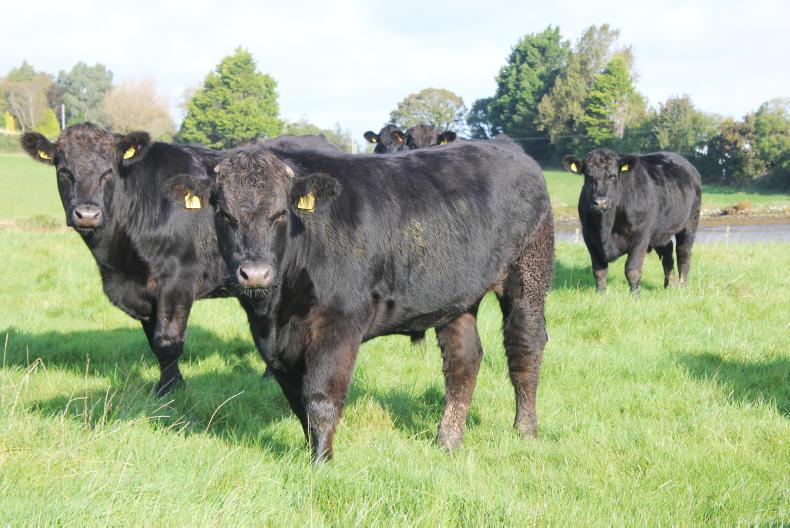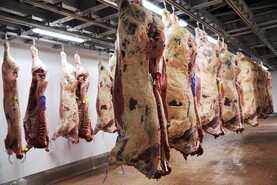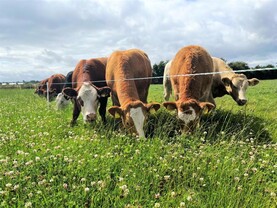For every man or woman who is prepared to actively protest about the current state of the beef industry, I suspect there are two or three more whose general mood is frustration tinged with apathy.
And the reason for that? I imagine it’s because we aren’t anywhere we haven’t been before, and the same old arguments keep getting stirred round and round in a seemingly endless fashion.
Over the years, I wish I had cut out newspaper articles and kept them during every beef crisis, because you could probably have reprinted most of them word for word and no one would have noticed the difference.
As soon as prices tumble and profits fall, the finger-pointing begins, with the usual list of culprits being pelted with accusations of incompetence and profiteering.
But the overwhelming reason for my lethargy regarding beef price is that I don’t see how I can blame anyone but myself. Like so many other farmers, I take a notion to buy cattle, knowing full well that the end price is little more than a lottery.
The net result of too many buyers bidding for a limited pool of cattle is a shed full of animals that are usually £100 or more in the wrong direction. The following year (and here’s the real nub of the issue) it’s a case of ‘stand on’, and we repeat the whole process.
For as long as I can remember, profits from fattening cattle on this farm have been up and down.
And if a rise in beef price resulted in a healthy profit, the subsequent cost of the replacement store animal soon negated any gain. Small wonder, therefore, that for years I’ve been referring to beef fattening on this farm as an expensive hobby.
Suckler cow
However, we must separate the purchase of store cattle from the plight of the suckler cow. The two are inextricably linked, but fundamentally different.
If store cattle are bought too dear, I can only blame myself, since no-one forces me to buy. But suckler farms are our primary producers and the lack of profitability in this sector is deeply worrying.
Try forgetting about the current situation and cast your eyes further ahead – what happens when the erosion (or removal) of agricultural support begins to bite at farm level? We do not have genuine support from the political establishment, we certainly don’t have sympathy from a general public who think cheap food is a never-ending gravy train, and we’re doing our best to alienate old friends by holding up two fingers at our European neighbours.
Some sort of direct support payment for every suckler cow is a logical option, but nowadays you’d have to assume that stringent caveats will be attached.
Given the ongoing urbanisation of the modern world and the environmental leaning of Westminster politicians, I’d guess that for every payment drawn down on a beef cow, there may have to be a tree planted (or similar gesture) at the same time.
Maybe that’s just fanciful thinking, but surely it would offer a lifeline to beleaguered farmers, while creating some sort of positive impact at the same time.
This crystal ball gazing isn’t easy, and perhaps in five or six years we will look back at the current turmoil and wonder what all the fuss was about.
Perspective
When negative thoughts and pessimism threaten to overwhelm me, I try to retain a sense of perspective. Dwell for a moment on the plight of those people who work for Wrightbus, or those thousands of folks who go into work every day, not knowing when they’ll be told to clear their desks. Then consider how many of them have young families and mortgages. Suddenly farming doesn’t seem just as hopeless.
Read more
Farmer Writes: low-input barley comes in at 2.67t
Farmer Writes: opting for Angus cattle over continentals
For every man or woman who is prepared to actively protest about the current state of the beef industry, I suspect there are two or three more whose general mood is frustration tinged with apathy.
And the reason for that? I imagine it’s because we aren’t anywhere we haven’t been before, and the same old arguments keep getting stirred round and round in a seemingly endless fashion.
Over the years, I wish I had cut out newspaper articles and kept them during every beef crisis, because you could probably have reprinted most of them word for word and no one would have noticed the difference.
As soon as prices tumble and profits fall, the finger-pointing begins, with the usual list of culprits being pelted with accusations of incompetence and profiteering.
But the overwhelming reason for my lethargy regarding beef price is that I don’t see how I can blame anyone but myself. Like so many other farmers, I take a notion to buy cattle, knowing full well that the end price is little more than a lottery.
The net result of too many buyers bidding for a limited pool of cattle is a shed full of animals that are usually £100 or more in the wrong direction. The following year (and here’s the real nub of the issue) it’s a case of ‘stand on’, and we repeat the whole process.
For as long as I can remember, profits from fattening cattle on this farm have been up and down.
And if a rise in beef price resulted in a healthy profit, the subsequent cost of the replacement store animal soon negated any gain. Small wonder, therefore, that for years I’ve been referring to beef fattening on this farm as an expensive hobby.
Suckler cow
However, we must separate the purchase of store cattle from the plight of the suckler cow. The two are inextricably linked, but fundamentally different.
If store cattle are bought too dear, I can only blame myself, since no-one forces me to buy. But suckler farms are our primary producers and the lack of profitability in this sector is deeply worrying.
Try forgetting about the current situation and cast your eyes further ahead – what happens when the erosion (or removal) of agricultural support begins to bite at farm level? We do not have genuine support from the political establishment, we certainly don’t have sympathy from a general public who think cheap food is a never-ending gravy train, and we’re doing our best to alienate old friends by holding up two fingers at our European neighbours.
Some sort of direct support payment for every suckler cow is a logical option, but nowadays you’d have to assume that stringent caveats will be attached.
Given the ongoing urbanisation of the modern world and the environmental leaning of Westminster politicians, I’d guess that for every payment drawn down on a beef cow, there may have to be a tree planted (or similar gesture) at the same time.
Maybe that’s just fanciful thinking, but surely it would offer a lifeline to beleaguered farmers, while creating some sort of positive impact at the same time.
This crystal ball gazing isn’t easy, and perhaps in five or six years we will look back at the current turmoil and wonder what all the fuss was about.
Perspective
When negative thoughts and pessimism threaten to overwhelm me, I try to retain a sense of perspective. Dwell for a moment on the plight of those people who work for Wrightbus, or those thousands of folks who go into work every day, not knowing when they’ll be told to clear their desks. Then consider how many of them have young families and mortgages. Suddenly farming doesn’t seem just as hopeless.
Read more
Farmer Writes: low-input barley comes in at 2.67t
Farmer Writes: opting for Angus cattle over continentals






 This is a subscriber-only article
This is a subscriber-only article










SHARING OPTIONS: